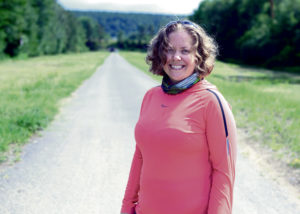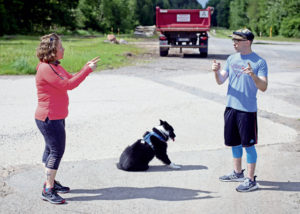For many of us, going on vacation means taking a break from our regular fitness routine and cardio sessions. For one Airman, cardio is her vacation.
She has crossed finish lines in the Netherlands, Norway, Ireland, Italy, Greece and all around Germany, racking up a shelf full of medals that she hangs on a board inscribed with “she believed she could, so she did.”
“Traveling for races gave me the opportunity to explore Europe alone; it gave me a purpose to go somewhere new by myself,” said Tech. Sgt. Jocelyn Ford, 86th Airlift Wing Public Affairs, photojournalist. “Even if I didn’t know anybody when I arrived, I always found a group of like-minded people who were all there for the same reason.”

Ford found camaraderie in the running community, but her passion for long distance running is more of a recent development rather than a lifelong practice.
“Growing up, I always wanted to be a runner but I could never stick with it. When I joined the Air Force, I ran for my fitness and did the occasional 5K for fun, but it wasn’t until my friend and I accidentally signed up for a half marathon that I started running consistently.”
This mistake began a love of the togetherness that comes from running alongside another person for 5, 10, or 15 miles and is a large reason why she decided to continue long distance running. Ford credits her friend, an ultra-marathon runner, as the person who made her start truly thinking of herself as a runner.
“It was the way he talked about running and his passion for the sport,” she said. “He was so fast — he could run almost twice my pace — and I knew he was running slower when he was running with me, but I wasn’t intimidated. I didn’t have anxiety about it because it wasn’t a race; it was for mental health and physical health, to experience what’s around you.”
Inspired by this, Ford completed her Road Runners Club of America certification to become a long distance running coach, and found that she was eager to help others find a passion for the sport she loves.
“When I’m helping someone as a coach, my main goal is to make sure they’re not doing anything that would hurt themselves. Your body isn’t going to hurt itself intentionally, so when people ask about breathing or if they should change their stride, I’m not going to try to change too much because your body is doing what it needs to naturally. What I can do is help create a program for you to reach your goals, whether you want to run faster or farther.”
Staff Sgt. Nesha Stanton, an 86th AW photojournalist, began running with Ford four months ago, and found that Ford’s patient coaching has transformed the way she sees herself.

“I never considered myself a runner,” Stanton said. “In fact, I hated it before meeting her. After having my daughter and battling an injury, she helped me regain my overall sense of well-being the last four months. Initially, it was difficult but I saw a difference in my mood and energy within two weeks.”
Ford manages to make running feel easygoing, through a combination of encouragement and conversation.
“Her positivity is contagious, and I can’t believe it myself when I say I actually enjoy running,” Stanton said. “Ford taught me it’s not about speed, it’s about taking your time to simply do the work. I’m truly grateful for her mentorship and am excited to see what new limits we can push.”
For those who want to become a part of the running community or get serious about running, Ford has some comforting advice.
“The cool thing about the running community is that as long as you go out and run, you’re a runner. There’s no runner’s body, there’s no prerequisites for pace or speed — as long as you have the capability to put one foot in front of the other, you’re a runner.”


